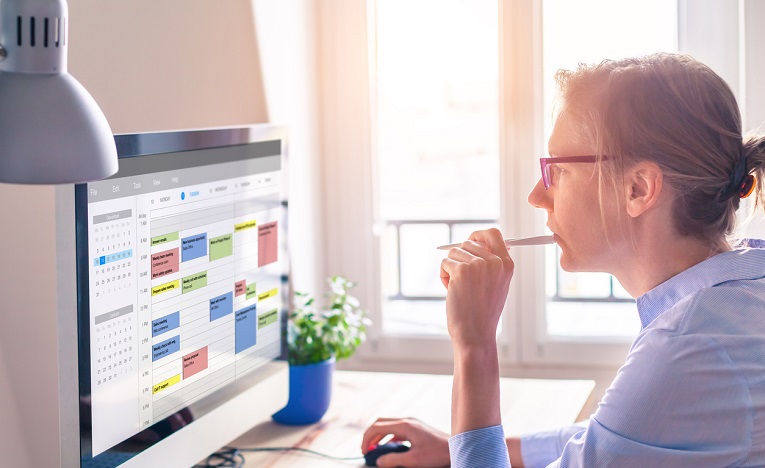Productivity experts answer your top 11 questions on getting stuff done

Posted: Wed 26th Feb 2020
Over 100 entrepreneurs tuned in for our webinar on productivity. We discussed strategies for staying motivated, finding a work-life balance and boosting productivity.
Alex Ayin, founder of social media agency Social Chain, and Karen Eyre-White, founder of productivity coaching company Go Do, were joined by host Emma Jones. Here are the top audience questions from this morning's webinar.
Scroll to the bottom of the post to watch the webinar.
1. What advice would you give to someone who's not a morning person?
Alex gets up every day at 5 am. He has a challenge with a friend where they take any alarm-snooze time off activities they enjoy, like watching Netflix.
He mentions author and life coach Mel Robbins' suggestion that you count down from five to zero and then jump out of bed. Another thing that has helped is creating an "effort pact", such as moving your phone to the other side of the room, so it's more difficult to turn your alarm off.
Karen added it's important to know yourself; if you're not a morning person you need to build that into your schedule. She finds creating a streak of certain habits is a great way to motivate yourself because you're less likely to give up on a new routine.
2. Do you use any apps to organise your time?
Karen said there's no one app for everyone. She uses Trello to keep track of her tasks and a hard copy diary.
Alex has a two-minute rule, adding anything that takes longer to his Trello board under "all tasks". There's another column for regular projects and he moves his priorities for the day from these columns.
"You waste so much brain energy trying to remember things," he added. "Putting the tasks in a to-do list means it's one less thing you need to think about. Just like having a routine for where you leave your house keys."
3. How do you realise you're procrastinating?
Internal and external triggers cause us to procrastinate, putting off boring tasks with distractions like social media.
"What's key is to own that," said Alex. "To know what you're feeling that makes you go onto that app and then realise you can throw that feeling back into the ocean."
He added that gamifying tasks, such as competing with colleagues to reach a milestone, really helps him get motivated.
4. Can having an accountability coach help?
Karen's business Go Do helps business owners be more productive, looking at three main areas:
Exploring how people feel about time through coaching and conversation
Practical exercises
Creating accountability
"I think procrastination at a deep level is to do with a fear of failure," she said. "Our brain is trying to protect us. I use techniques to override my brain, such as doing ten minutes on it or eating the frog, which means using your energy to do something tough at the start of the day so you get momentum."
5. Procrastination can be part of the process when it comes to creativity
According to Alex, the best ideas don't come when you're under pressure, especially when you're trying to be creative.
His team has introduced a walking session, ideally in a location that's related to a client brief, to get ideas. They have also moved away from trying to do everything in one meeting.
6. How do you cope with balancing childcare and running a business?
Both Alex and Karen have children and have had to work hard on building a healthy routine.
"The biggest pressure I put on myself mentally is that I'm not always there. What I've done is that I've put my week into buckets," said Alex. This includes blocks of time to get eight hours sleep, commute and spend time with his newborn, including during the evening and weekends.
Karen combines two days of childcare with running Go Do.
"It's about looking at your week and working out what pockets you have to work in. I find it easier to plan it out. Knowing when you're working is key to finding balance," she said.
7. Turn off your notifications!
Both guests agreed that notifications impact your productivity. Alex turns notifications off when he gets home, so that he can be as "present" as possible. Karen has them off all the time.
8. How do you get over that feeling of having too much to do?
A survey of webinar watches found 4% hardly ever feel anxious, 55% feel anxious some of the time and 41% often.
Alex recommended breaking big tasks into small jobs. "If the project's really big I would focus on the easiest thing. I start to think about what everyone can do great today, in the next few hours," he said.
Karen added that if you're approaching burnout, rather than feeling overwhelmed about a specific thing, you need to step back and take a break.
Read our tips on the practical steps you can take to reignite your passion for business for advice on how to build your enthusiasm.
9. Which elements of the business should you spend most of your time on?
It's a difficult point to answer - Enterprise Nation's Emma described it as "the million-dollar question".
Alex said it depends on what type of business you're creating. He plans his week every Sunday, looking at key projects and setting priorities.
"Setting the vision and values is key, and setting an example," he added. "We do what we see rather than what we hear, so it's important for you to set the standards."
10. How can you make your workspace more productive?
Karen said it's important to make your workspace appealing. She needs a tidy space, with lots of light - "it's about picking the right space for you," she said.
Alex created a vision board with achievements on the left-hand side. Images of the life and business he wants to create and the people that inspire him are on the right-hand side.
"We operate 90% on our subconscious brain. Writing your goals down will help you keep working on them."
11. How do you get into the zone?
Alex had three suggestions for improving concentration.
Eliminate distractions
Try to make the task as engaging as possible or give yourself a reward for reaching milestones
Focus on what you're curious about
Karen added that it's important to think about where you're doing work.
"A good way of shifting your headspace is to go somewhere new," she said. "Once a quarter I take myself to a DIY planning retreat to have a day or two doing the planning and have that headspace."
Watch the webinar
Get business support right to your inbox
Subscribe to our newsletter to receive business tips, learn about new funding programmes, join upcoming events, take e-learning courses, and more.
Start your business journey today
Take the first step to successfully starting and growing your business.
Join for free
